Explanation of my 10 Ballon d'Or 1973
This is my ranking, my opinion on the Ballon d'Or of the year 1973. This ranking is based on the calendar year, not the season. What counts for this ranking is the player's regularity over the calendar year, the number of matches played, the ability to raise his level in big games, statistics (goals, assists, clean sheets, goals conceded, etc.) and trophies won (collective and individual).
#10 Jupp Heynckes
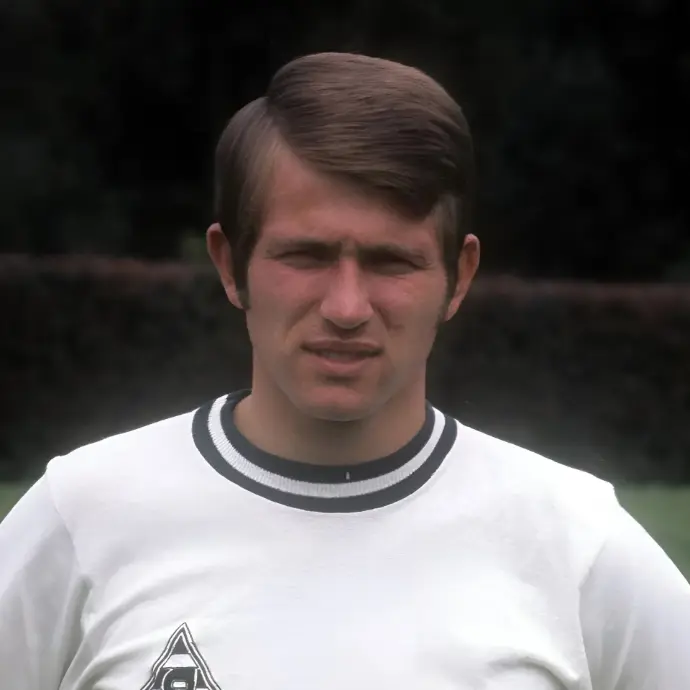
- Age : 27/28 years old
- Club : Borussia M'gladbach
- Statistics : 64 games, 53 goals, 3 assists
- Trophies : Finalist Europa League, German Cup
- Individual Awards : Europa League TOTY, Europa League Golden Shoe (12 goals)
In 1973, Jupp Heynckes was the calm before the storm—clinical, composed, and quietly devastating. At 28, he wasn’t just a striker; he was a metronome of menace, ticking with precision in a Borussia Mönchengladbach side that was learning how to turn promise into power. That year, Heynckes didn’t explode—he simmered. But every touch, every run, every goal hinted at the inferno to come. He scored 28 times in the Bundesliga, finishing just behind Gerd Müller in the scoring charts. But Heynckes wasn’t chasing Müller—he was carving his own path. Where Müller was instinct, Heynckes was intention. He read the game like a midfielder, moved like a winger, and finished like a sniper. His goals weren’t just numbers—they were statements. A volley here, a header there, a low drive into the corner when the moment demanded calm. In Europe, he was just as relentless. Mönchengladbach reached the UEFA Cup final, and Heynckes was their sword and shield—scoring, assisting, leading. He netted 12 goals in the competition, earning the Golden Shoe and a place in the Team of the Tournament. And though they fell to Liverpool in the final, Heynckes had already announced himself to the continent. For West Germany, he was the ever-ready weapon—part of the squad that would soon conquer the world. In 1973, he wasn’t yet the headline. But he was the paragraph you couldn’t skip. Trusted by his coaches, feared by defenders, and admired by teammates, Heynckes was the kind of player who made greatness look inevitable.
#9 Miguel Brindisi
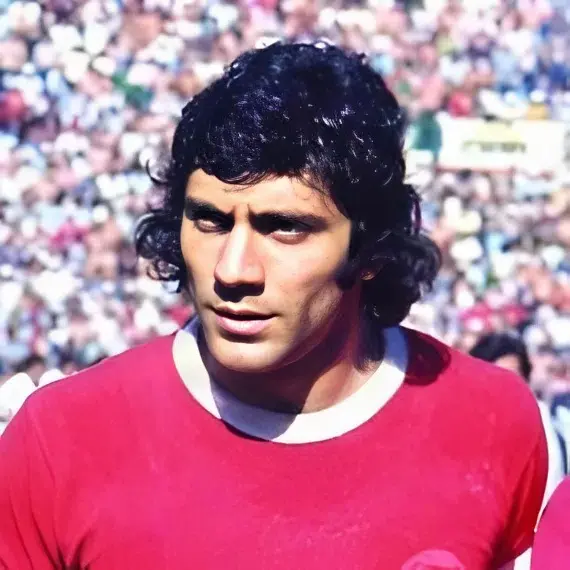
- Age : 22/23 years old
- Club : CA Huracán
- Statistics : 39 games, 26 goals, / assists
- Trophies : Argentinian League
- Individual Awards : South American TOTY, Argentinian POTY, Argentinian League POTY, Argentinian League TOTY
In 1973, Miguel Brindisi was elegance in motion—silken touch, relentless drive, and a mind two steps ahead of the game. At 22, he was the heartbeat of César Luis Menotti’s Huracán, a team that didn’t just win—they enchanted. That year, Brindisi wasn’t merely a midfielder. He was a conductor, a craftsman, a visionary with boots laced in poetry. Huracán danced to his rhythm. With Carlos Babington threading beside him and René Houseman tearing down the flanks like a gust of genius, Brindisi orchestrated one of the most beautiful symphonies Argentine football had ever heard. They didn’t just win the Metropolitano—they redefined it. And Brindisi was the axis around which it all spun. He was a box-to-box before the term had a name—recovering, relaying, creating. He could glide past defenders or slice them open with a pass no one else saw. His technique was velvet, his vision surgical. And though he played deep, he struck like a forward—his goals were not just timely, they were inevitable. That season, he was voted the second-best player in South America, behind only Pelé. That’s not a footnote. That’s a headline. For Argentina, he was already a fixture—called up at 19, trusted in the engine room, and destined for the 1974 World Cup. He didn’t just wear the shirt. He elevated it.
#8 Günter Netzer
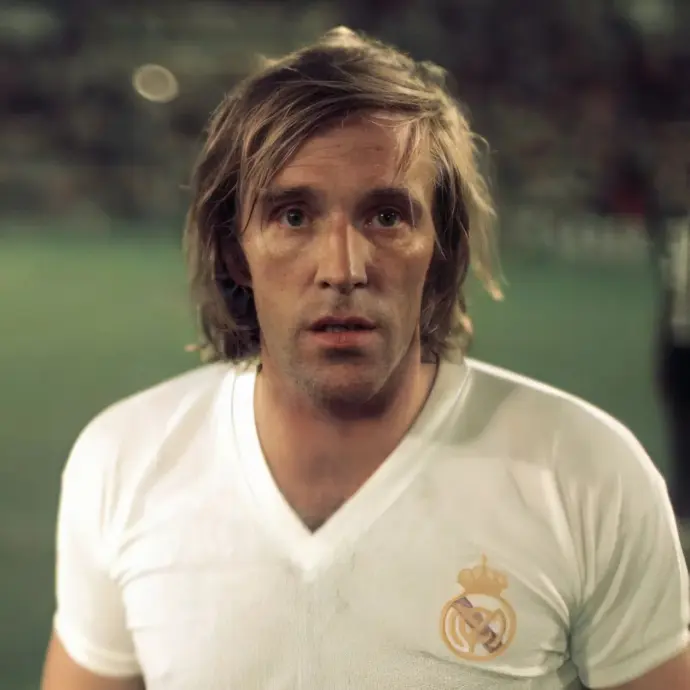
- Age : 28/29 years old
- Club : Borussia M'gladbach/Real Madrid
- Statistics : 37 games, 8 goals, / assists
- Trophies : Finalist Europa League, German Cup
- Individual Awards : German POTY, Bundesliga POTY, Bundesliga TOTY
In 1973, Günter Netzer was football’s contradiction—bohemian and brutal, elegant and explosive. At 28, he was the soul of Borussia Mönchengladbach, a playmaker who didn’t just dictate tempo—he rewrote the script. That year, Netzer wasn’t just a midfielder. He was a movement. A long-haired icon with a Ferrari in the parking lot and a cannon in his right foot. He had already conquered Europe the year before, orchestrating West Germany’s triumph at Euro 1972 with passes that bent time and space. But 1973 was his swan song in Germany—and he made sure it echoed. Injuries and tension with coach Hennes Weisweiler kept him on the fringes, but Netzer didn’t fade. He waited. And then came the DFB-Pokal final. June 23rd, 1973. Düsseldorf. Mönchengladbach vs. Köln. Netzer started on the bench—benched by his own manager, days after announcing his move to Real Madrid. But when extra time came, and the team needed a spark, Netzer stood up, looked at the coach, and said the words that became legend: “Ich spiel’ dann jetzt.” “I’ll go in now.” Three minutes later, he scored the winner. A low, curling shot from the edge of the box—pure Netzer. Cold, calm, inevitable. He didn’t just win the cup. He wrote himself into football folklore. That summer, he left for Real Madrid, where he would win two La Liga titles and bring his artistry to the Bernabéu. But 1973 was the year he became myth. The year he proved that genius doesn’t ask for permission—it takes the ball, and the moment, and bends them both to its will.
#7 Pelé
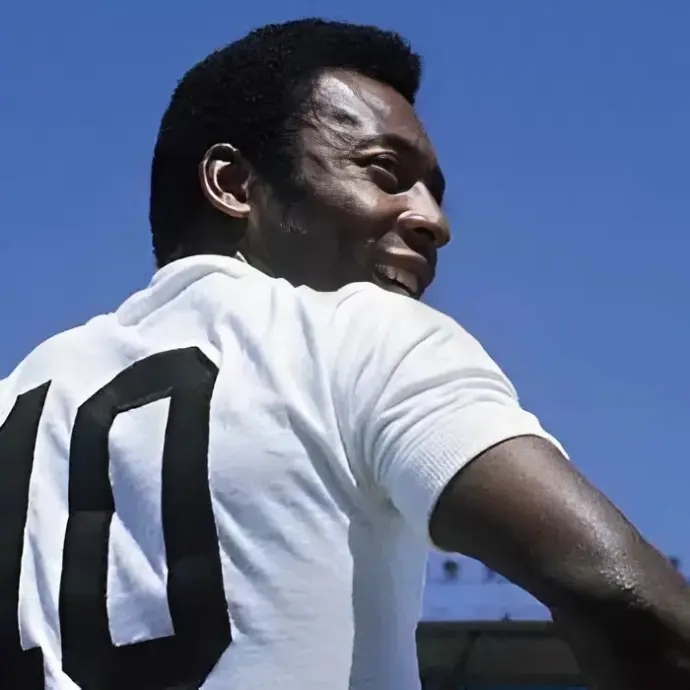
- Age : 32/33 years old
- Club : Santos FC
- Statistics : 40 games, 25 goals, 7 assists
- Trophies : São Paulo Championship
- Individual Awards : South American POTY, South American TOTY, São Paulo Championship TOTY, São Paulo Championship Golden Shoe (11 goals)
In 1973, Pelé was no longer just a footballer—he was a living monument. At 32, the crown still fit, but the weight of a thousand matches had begun to press on his shoulders. And yet, even in the dusk of his time at Santos, Pelé didn’t fade—he glowed. That year, he wasn’t chasing records. He was defending a legacy. And he did it with grace, grit, and the kind of genius that doesn’t age—it evolves. Santos was no longer the untouchable machine of the early '60s, but with Pelé, they still had magic. He led them to the Paulista championship, his final domestic title with the club. It was a farewell wrapped in drama—a fiercely contested campaign, a final won in the dying embers of his Brazilian chapter. He wasn’t just playing matches. He was writing epilogues. That same year, Santos toured the world like a rock band with a ball. Asia, Africa, Europe—wherever they went, Pelé was the show. In Bordeaux, he danced across the Parc Lescure, scoring a volley and gifting a goal with a pass only he could see. The crowd didn’t just watch—they witnessed. Because when Pelé played, the game felt sacred. He was still scoring, still dazzling, still drawing defenders like moths to a flame. But there was a sense of farewell in the air. The King was preparing to leave his kingdom. The move to the New York Cosmos was still two years away, but the world tour felt like a curtain call. In 1973, Pelé wasn’t chasing greatness. He was reminding us that he had already caught it—and held it longer than anyone else. He was the past, the present, and somehow still the future. A man who had won three World Cups, scored over a thousand goals, and made football a global language.
#6 Eusébio
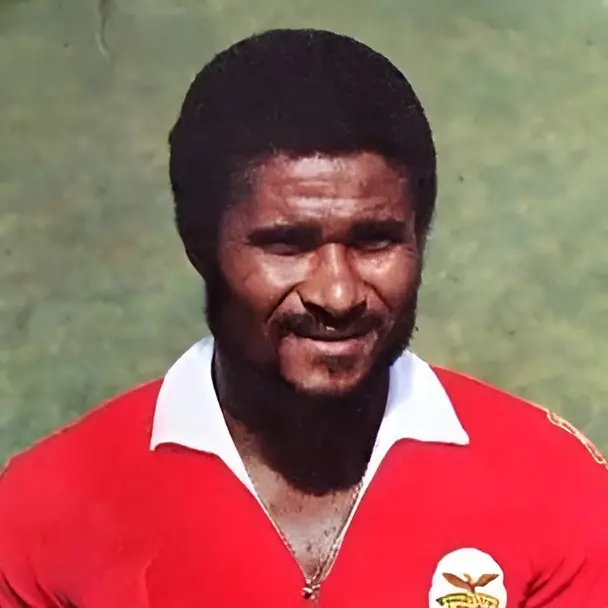
- Age : 31 years old
- Club : Benfica Lisbon
- Statistics : 34 games, 31 goals, / assists
- Trophies : Portuguese League
- Individual Awards : Portuguese POTY, Portuguese League POTY, Portuguese League TOTY, Portuguese League Golden Shoe (40 goals)
In 1973, Eusébio was no longer chasing greatness—he was being celebrated by it. At 31, the Black Panther still prowled with elegance and power, but now every touch carried the weight of memory. He wasn’t just a striker anymore. He was a symbol. A living legend in Benfica red, whose name echoed from Lisbon to Lourenço Marques and beyond. That year, the goals still came—he won the European Golden Boot, his second, with 40 goals in the Portuguese league. But it wasn’t just the numbers. It was the way he moved—graceful, deliberate, like a man who knew the end was near but refused to go quietly. His right foot still struck like thunder, his acceleration still left defenders grasping at shadows. He wasn’t fading. He was roaring one last time. And then came September 25th, 1973—a night that felt like a coronation and a goodbye. At the Estádio da Luz, the world gathered to honor him. George Best, Bobby Charlton, Gordon Banks, Paulo Cézar—they didn’t come to compete. They came to pay tribute. It wasn’t a match. It was a moment. A celebration of a man who had carried Portuguese football to the world stage and left it there, shining.
#5 Gianni Rivera
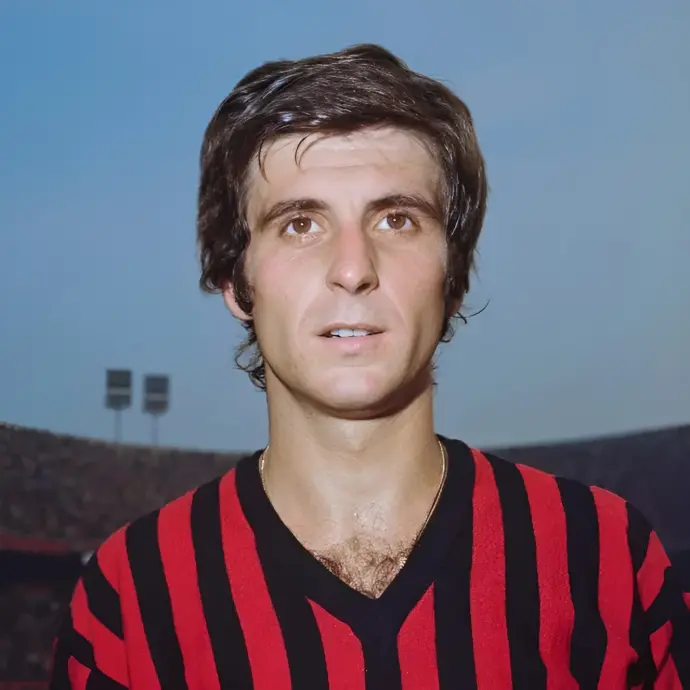
- Age : 29/30 years old
- Club : Milan AC
- Statistics : 47 games, 18 goals, 15 assists
- Trophies : Cup Winners Cup, Finalist UEFA Supercup, Serie A Vice-Champion, Italian Cup
- Individual Awards : Serie A TOTY, Serie A Golden Shoe (17 goals)
In 1973, Gianni Rivera was football’s quiet storm—measured, magnetic, and impossibly elegant. At 29, he was no longer the prodigy who had dazzled Europe in the '60s. He was the maestro. The man who made the game breathe. That year, Rivera didn’t run the pitch—he conducted it. Every pass was a sentence. Every touch, a stanza. And the whole match? A sonnet in red and black. For AC Milan, he remained the soul of the side. He didn’t need to sprint—he glided. He didn’t need to shout—he whispered with the ball. That season, he led Milan to the Coppa Italia and the Cup Winners’ Cup final, threading passes through defenses like silk through a needle. He wasn’t just playing. He was painting. And for Italy, 1973 was a year of transition. The national team was aging, the shadows of 1970 still long. But Rivera was still there, still vital. In a friendly against Brazil that June, he faced off against Rivellino, Jairzinho, and Clodoaldo—and held his own with poise and precision. He didn’t score. He didn’t need to. His influence was in the rhythm, the geometry, the calm in the chaos.
#4 Gerd Müller
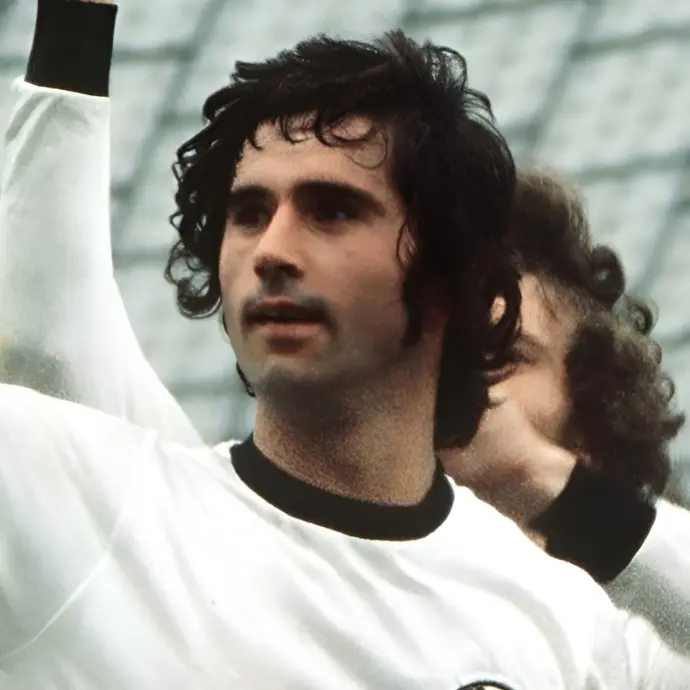
- Age : 27/28 years old
- Club : Bayern Munich
- Statistics : 52 games, 50 goals, 11 assists
- Trophies : Bundesliga
- Individual Awards : Champions League TOTY, Champions League Golden Shoe (12 goals), Bundesliga TOTY, Bundesliga Golden Shoe (36 goals)
In 1973, Gerd Müller was inevitability in cleats. At 27, he wasn’t just scoring goals—he was redefining what it meant to be a striker. That year, Müller didn’t chase defenders. He haunted them. He didn’t need space—he created it in the blink of a turn, the twitch of a shoulder. And when the ball came, there was only ever one ending: net, rippling, silence. For Bayern Munich, he was the engine and the exclamation point. He scored 36 goals in the Bundesliga, claiming yet another top scorer title—his fifth in eight seasons. Bayern won the league, and Müller was the reason. He didn’t just lead the line. He led the league. His goals weren’t just frequent—they were final. One-touch finishes, headers from impossible angles, toe-pokes through crowds—he made the extraordinary look mechanical. In Europe, he was just as ruthless. Bayern were building toward continental dominance, and Müller was their spearhead. Every cross was a promise. Every rebound, a sentence. He didn’t need flair. He had finality.
#3 Dino Zoff
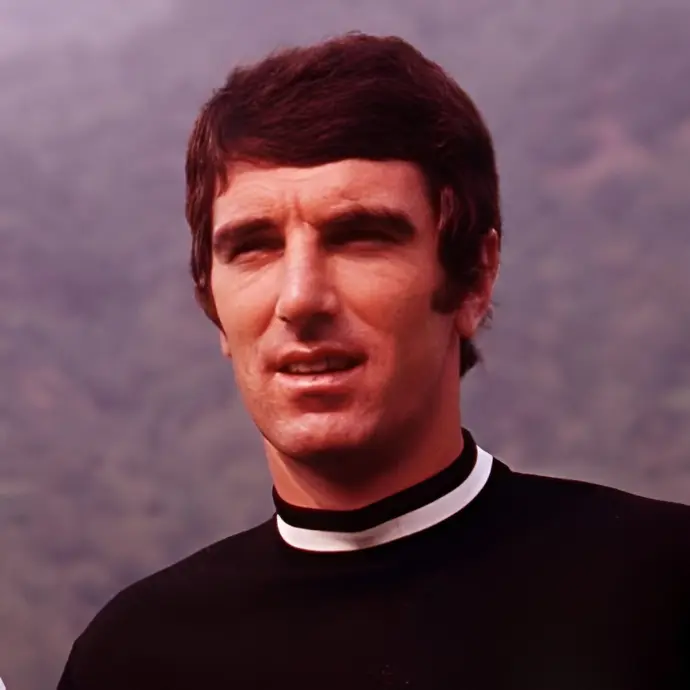
- Age : 30/31 years old
- Club : Juventus Turin
- Statistics : 57 games, 44 goals conceded, 22 clean sheets
- Trophies : Finalist Champions League, Finalist Intercontinental Cup, Serie A
- Individual Awards : Champions League TOTY, Serie A TOTY
In 1973, Dino Zoff was silence made steel. At 31, he didn’t dive for the cameras or shout for attention. He didn’t need to. His presence was enough. Calm, immovable, eternal. That year, Zoff wasn’t just a goalkeeper—he was a monument. A man who made the goal feel smaller, the net feel unreachable. For Juventus, he was the anchor in a team chasing glory. They reached the final of the European Cup, and though they fell to Ajax, Zoff stood tall—unshaken, unyielding. He didn’t fly. He hovered. He didn’t guess. He knew. His positioning was perfect, his hands sure, his demeanor ice-cold. He was the kind of keeper who made strikers second-guess themselves before they even shot. In Serie A, he helped Juventus to a second-place finish, conceding just 18 goals in 30 matches. Numbers that whispered dominance. He wasn’t flashy. He was flawless.
#2 Franz Beckenbauer
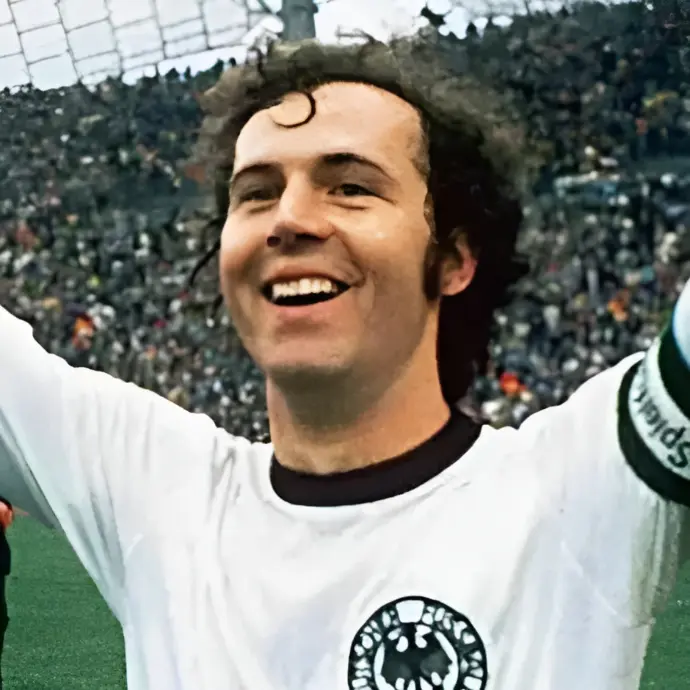
- Age : 28/29 years old
- Club : Bayern Munich
- Statistics : 56 games, 5 goals, 11 assists
- Trophies : Bundesliga
- Individual Awards : Bundesliga TOTY
In 1973, Franz Beckenbauer didn’t play football—he orchestrated it. At 28, he was the general who never raised his voice, the emperor who ruled with a glance. That year, Beckenbauer wasn’t just the best defender in the world—he was the most complete footballer on the planet. A libero in name, but in truth, a system unto himself. For Bayern Munich, he was the axis around which everything turned. They won the Bundesliga, and Beckenbauer was its architect. He didn’t just stop attacks—he started them. He glided out of defense like a conductor stepping onto the podium, head up, eyes scanning, already seeing the pass that would split the field in two. His elegance was deceptive. Behind the poise was precision. Behind the calm, control. In Europe, Bayern fell to Ajax in the European Cup quarterfinals, but even in defeat, Beckenbauer stood apart. Against Cruyff’s Total Football, he was the one man who could read the chaos and respond with clarity. He didn’t chase shadows—he cast them.
Winner : Johan Cruyff
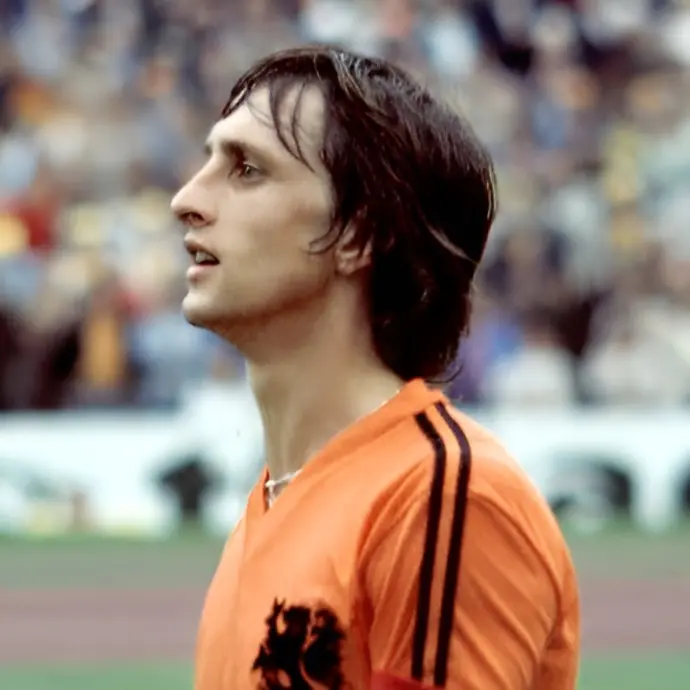
- Age : 25/26 years old
- Club : Ajax Amsterdam/FC Barcelona
- Statistics : 34 games, 23 goals, 21 assists
- Trophies : Champions League, Eredivisie
- Individual Awards : Dutch POTY, Champions League POTY, Champions League TOTY, Eredivisie TOTY
In 1973, Johan Cruyff didn’t just play football—he reimagined it. At 26, he was already a three-time European champion with Ajax, the face of Total Football, and the most intelligent player on any pitch he stepped onto. But that year, Cruyff didn’t just change clubs—he changed the course of a club’s history. He left Amsterdam for Barcelona, and with him came a revolution. The transfer was seismic: 6 million florins, a record fee at the time. But Cruyff wasn’t a price tag—he was a philosophy. And from the moment he arrived in Catalonia, he made it clear: Barça would no longer bow to Real Madrid. He debuted in October, and by December, he had already delivered a miracle. On December 22, 1973, against Atlético Madrid, Cruyff scored a goal that defied physics and logic. A cross came in too high, too long, already drifting out of play. But Cruyff leapt, twisted mid-air, and with the back of his heel, flicked the ball past the keeper. It was ballet and geometry, instinct and invention. The Camp Nou didn’t cheer—it gasped. That season, Barcelona won La Liga for the first time in 14 years, and Cruyff was the catalyst. He didn’t just score—he liberated. He played as a forward, a midfielder, a conductor. He was everywhere and nowhere, always two moves ahead. His teammates followed his rhythm. His opponents followed his shadow.